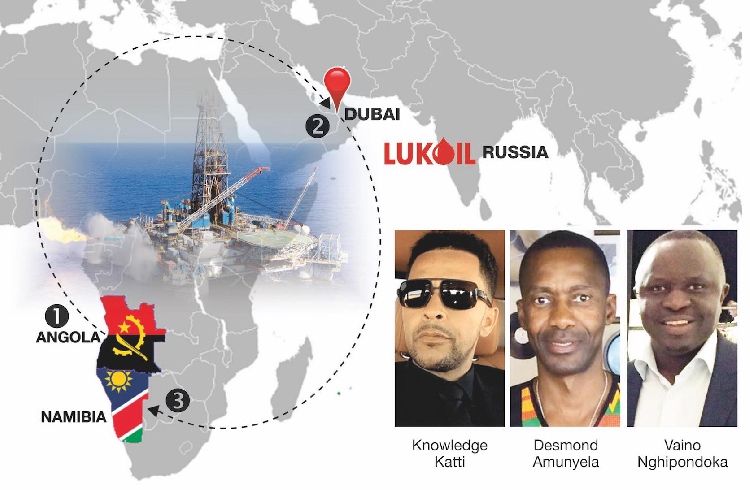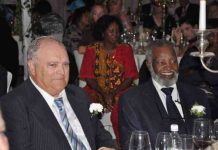By Shinovene Immanuel | 25 November 2016
A BUSINESS deal amounting to N$11 billion to allow the Namibian government to buy crude oil from Angola and refine it through a Russian company for the benefit of Namibian consumers, has been stalled by a scramble among politically-connected Namibian businessmen for a slice of the action.
The businessmen – Knowledge Katti, Desmond Amunyela, Vaino Nghipondoka and Swapo politician Armas Amukwiyu – are all friends or former friends of President Hage Geingob. Katti, Amunyela and Amukwiyu declined to comment. Nghipondoka said “To us, this deal is dead. In business, you win some and lose some. Life goes on”.
The precise value of the deal could not be established, but energy minister Obeth Kandjoze said the intention was originally to supply all the country’s fuel imports – 1,2 billion litres of diesel, unleaded petrol, heavy fuel oil for vessels, and jet fuel.
Information from the Namibia Statistics Agency show that Namibia imported petroleum products valued at over N$11 billion last year.
The memorandum of understanding between Namibia and Angola, signed in 2013, has never been translated into a binding contract, and has now lapsed.
Sources within government allege that the transaction was deliberately aborted by Geingob’s administration to favour Katti, who is known to be a friend of both Geingob and Kandjoze.
It was during Kandjoze’s tenure as exploration manager at oil parastatal Namcor that his friend Katti turned into a millionaire oil exploration dealer. Katti, a known influence peddler, repeatedly denied links to the Angolan transaction.
IN THE BEGINNING
The Angolan oil deal saga began in June 2013 when Namibia’s former energy minister, Isak Katali, and Angola’s petroleum minister, Jose Maria de Vasconcelos, signed a memorandum of understanding, with Angola facilitating the supply of crude oil. As Namibia imports all its refined petroleum from abroad, the plan was to buy cheaper crude oil from Angola’s state-owned oil company, Sonangol, and refine it, using a third party in Dubai via a Russian-owned trading partner, Lukoil. It would then be imported into Namibia through the country’s energy parastatal, Namcor. Lukoil is one of Russia’s largest oil companies.
In September 2015, the energy ministry informed Lukoil that it had been chosen “as the technical, financial and operational trading partner with the mandate to operate the crude-for-petroleum product swap transaction with Sonangol”.
Lukoil would enter into commercial agreements with Namcor and Sonangol, paying Sonangol for the oil and managing the operation and market price risk on Namcor’s behalf, states a letter written by the permanent secretary of energy, Simeon Negumbo.
Namibia’s procurement laws encourage foreign entities to partner with locals in state contracts. Moove Consulting, the private consultant appointed to put together the final agreement, recommended two other politically-connected businessmen as Lukoil’s local partners – Paragon Investment Holdings’ co-owner Desmond Amunyela, and the darling of Namibia’s state contracts, Vaino Nghipondoka. The Swapo coordinator in the Oshikoto region, Armas Amukwiyu, who at the time was Geingob’s blue-eyed boy, also formed the partnership with Amunyela’s group. These three were Geingob’s friends before he became President. In fact, they supported Geingob’s campaign to become Swapo vice president in 2012, a position which allowed him to be elected as the national President.
When the deal was being formulated in 2013, Amunyela and Nghipondoka were believed to have been on friendly terms with Geingob and to have unlimited access to him. Their job, said insiders, was to pull political strings at the highest levels of government to ensure the deal went through.
The businessmen were set to benefit from the deal by receiving a percentage of the income from the importation of petroleum of this contract over three years. The exact percentage could not be established, but estimates show that they could get a percentage of over N$33 billion in three years.
WIND OF CHANGE
The Namibian understands that in December 2014, Amunyela had a personal fall-out with the President – at which point, the sources said, Katti and his associates with links to the Presidency moved to insert themselves in the transaction.
By 2015, Katti was seen to have the upper hand in the Angola contract. Indeed, he is said to have been together with a team of Angolan businessmen who visited Geingob at State House last year.
Katti allegedly rejected a proposal that he joins forces with Amunyela and Nghipondoka in a new consortium, believing that he could consolidate the deal without their help.
The sources charged that the three-year oil agreement had been allowed to expire so that it could be renegotiated and Katti and his team inserted as local partners.
They said Geingob and presidential affairs minister Frans Kapofi blocked energy minister Kandjoze on two occasions last year from going to Angola to finalise the transaction.
In an interview, energy minister Kandjoze confirmed that the deal has lapsed, and will have to be renegotiated.
“Unless otherwise expressly provided for in the memorandum, insofar as it concerns the renewable terms, the agreement would have to be renegotiated afresh,” he stated.
Kandjoze said he was the wrong person to ask about the selection of Lukoil as Namcor’s agent, or the role of its local partners.
This is despite the fact that his permanent secretary, Negumbo, wrote to the Russian company confirming its appointment six months after Kandjoze was appointed energy minister.
Asked whether his friend Katti had shown an interest in participating in the deal, the minister said this was “water under the bridge”, and that he had dealt with the issue extensively “in the context of the many answers I have provided”.
“Knowledge Katti can speak for himself … and I cannot represent him or anyone else’s position for that matter.”
Kandjoze told The Namibian in July that he is “unashamedly” Katti’s friend, but insisted that the energy ministry “is not a one-man institution, since there are approval systems that need to be followed”. The minister was strongly criticised by his own officials earlier this year over his plan to hand Katti an entire oil exploration block off the Namibian coast where non-commercial oil was discovered in 2013. Questions emailed to Kandjoze by The Namibian in September this year were leaked to Katti a few hours after they were sent. Katti then posted some of the questions on his Facebook and Twitter social media accounts, together with the claim that attempts to link him to the Angolan oil deal were fabricated and had “zero truth”.
Asked whether he was disappointed that the deal failed to take off, Kandjoze said “In business, what wasn’t meant to be, wasn’t meant to be. It’s water under the bridge right now”.
He said he could not respond to allegations that Geingob prevented him from going to Angola. Presidential affairs minister Kapofi said all travel decisions of ministers are the prerogative of the President. He said after consultations with the minister concerned, approval is either granted, or the trip denied approval.
He said any agreement that Namibia enters into with another government will ordinarily be presented to Cabinet for consideration.
“The body of the memorandum of understanding clearly spelled out the exact activities to be covered by this agreement. However, the implementation process has since come to an end with the expiry of the tenure of the agreement,” he said.
* This story was produced by The Namibian’s investigative unit in association with the amaBhungane Centre for Investigative Journalism, an independent non-profit company in South Africa.






